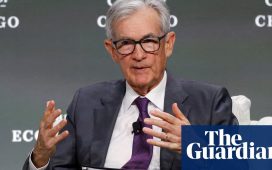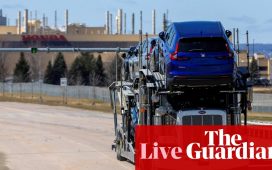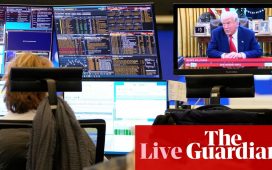Uber posts first operating profit as public company
Ride-hire company Uber has reported its first full-year of operating profits since it floated on the stock market five years ago.
Uber has reported it made income from operations of $1.11bn in 2023, up from a loss of $1.832bn in 2022, beating expectations.
Revenues grew 17% last year, lifted by a 24% jump in trips in Uber vehicles.
“2023 was an inflection point for Uber, proving that we can continue to generate strong, profitable growth at scale,” said Dara Khosrowshahi, CEO, adding:
“Our audiences are larger and more engaged than ever, with our platform powering an average of nearly 26 million daily trips last year.”
Uber had consistently made an operating loss since debuting on Wall Street in May 2019. Losses rose from $3bn in 2018 to $8.6bn in 2019, before dropping to $4.86bn in 2020, $3.8bn in 2021 and then $1.832bn in 2022.
Profits last year were driven by higher demand for mobility bookings (ride hires) as well as deliveries (Uber Eats). Bookings grew by 8% quarter-on-quarter, while deliveries were 6% higher quarter-on-quarter.
Uber predicts that core profits and gross bookings will be strong in the first quarter of this year.
For Q1 2024, it predicts:
That would be an increase on the adjusted EBITDA profits of $1.283bn in Q4 2023, driven by $37.5bn of gross bookings in the last quarter.
Thomas Monteiro, senior analyst at Investing.com, says:
“It was a fantastic quarter for Uber, which shows that the long-term post-pandemic turnaround in the company is finally beginning to bear fruit. As we prepare for a faster-growth environment in the second semester of the year, particularly as financial conditions begin to improve, it is likely that the company will be perfectly positioned to lead the ride-hailing space in its quest for new innovations.
“The most positive point in this report for long-term investors was the company’s ability to show sustained improvement in its EBITDA margins and cash flows. This is likely to provide the company with serious competitive advantages going forward.
In 2022, a leak reported by the Guardian showed how Uber had broken laws, duped police and secretly lobbied governments as it rolled its services out.
Key events
Closing post
Time for a recap….
Here’s the rest of today’s news:
S&P 500 index at new high
Back on Wall Street, the S&P 500 index has touched a new record high.
Materials, consumer discretionary, and energy stocks are leading the rally, as investors ponder how quickly US interest rates will be cut this year.
The S&P 500 reached a new all-time high 🇺🇸 driven by gains in megacap and semiconductor stocks, leading to a broad rally on Wall Street. Following the market’s opening, the Dow Jones Industrial Average saw an increase of 0.4%, reaching 38,668.65, while the S&P 500 climbed 0.5% to… https://t.co/D3heAhU53s pic.twitter.com/YDceuPqHYR
— Share_Talk ™ (@Share_Talk) February 7, 2024
The recent earnings season has provided some support.
Robert Pavlik, senior portfolio manager at Dakota Wealth, says (via Reuters):
“So far, earnings have come in a little better than expected. It’s not outstanding, but certainly better than the negative numbers people were expecting.
More gloom in Germany; one of the country’s largest landlords has predicted that home prices could fall as much as 30% below their 2022 peak.
TAG Immobilen co-CEO Martin Thiel told Reuters that “We expect further losses in value,” adding that while he expected the fall in valuations to bottom out at 20%.
Thiel explained:
“You have to be prepared in case it is not the 20% but 25% or 30%. The balance sheet must be able to withstand that. You simply need that cushion.
He added:
“The market for transactions is incredibly difficult. You hardly see any big transactions.”
German house prices are already 10% below their record high, set in 2022.

Alex Lawson
Thames Water has been ordered to update its service commitment plan by the regulator Ofwat after a minister said the company’s performance in regards to sewage dumping and serving customers was “completely unacceptable”.
Robbie Moore, the floods minister, said Britain’s biggest water supplier was “under no illusions over the scale of the challenge” as MPs heard that Thames had allowed waterways to become polluted and homes to be flooded with sewage.
At a Westminster Hall debate on the performance of the company in Oxfordshire, Moore said:
“Ofwat have directed Thames Water to produce a service commitment plan.”
“This will require Thames Water to publicly commit to a plan for how they will start to turn their performance around. Please be assured that regulators and the government will be scrutinising these plans in detail to make sure every possible is being done to get the company back on track in terms of service delivery, environmental performance and ensuring that the customers get what they quite rightly deserve in terms of good supply.”
Shares in social media group Snap have dropped by a third in early New York trading.
Investors are hammering Snap after it missed analyst expectations for revenue growth last night, and also issued a forecast below Wall Street expectations.
Uber’s CEO, Dara Khosrowshahi, has told CNBC’s “Squawk Box” that his company benefited from the continued shift in consumer spending from retail to services.
“We continue to see consumer strength, and especially consumer strength as it relates to services.
“People are going out to dinner, they’re going out to concerts, sports events, etc. And when people go out and they spend money, or when they want anything delivered to their home, Uber benefits.”
Uber shares drop despite profit
Wall Street traders don’t seem too impressed by Uber’s first annual profit since it floated five years ago.
Shares in the ride-hire and delivery company are down 2.5% in early trading in New York, at $68.65.
Uber ( $UBER ) shares are off 2.5% despite beating analyst expectations with EPS of $0.66 on $9.93 billion (up 15.4% YoY) on strong demand for ride sharing and food delivery services. #uber #earnings
— Predator Research (@PredatorResrch) February 7, 2024
The US trade deficit contracted sharply in 2023, new data shows, as imports declined and exports rose.
In 2023, the US goods and services deficit decreased by $177.8bn, or 18.7%, to $773.4bn, down from $951.2bn in 2022.
Exports increased by $35bn or 1.2%, while imports decreased by $142.7bn or 3.6%.
In December alone, the trade deficit rose to $62.2bn, up £300m on November’s $61.9bn.
Andrew Hunter, deputy chief US economist at Capital Economics, explains:
The modest widening in the nominal trade deficit in December to $62.2bn, from a revised $61.9bn, came as both exports and imports rebounded by around 1.5% month-on-month.
The rise in goods exports was fairly broad based, although it included fairly large gains in the volatile non-monetary gold and pharmaceuticals categories, while exports of services also rose quite strongly. In a potentially positive sign for consumption, imports were driven higher by a particularly big rise in consumer goods imports, although that too included a fairly big gain in pharmaceuticals.
$UBER conference call summary: We had a standout quarter and year, and we exceeded our outlook for the quarter. We showed we can continue to grow at scale, and we are excited about the innovation we have in the works. We have some surprises coming that we aren’t ready to… pic.twitter.com/xrjMDeHT7P
— Earnings Whispers (@eWhispers) February 7, 2024
Uber’s first full-year of operating profits is fuelling speculation that the company could announce a share buyback programme soon.
In response to the results, chief financial officer Prashanth Mahendra-Rajah pledged to provide an update on “returning capital to shareholders” next week, adding that “disciplined investment” had helped bolster the company’s fourth-quarter results.
Uber is pulling off “one of the best turnarounds ever” in the technology world, says analyst Dan Ives of Wedbush.
Uber delivers another Kelce-like quarter. One of the best turnarounds ever in the tech world by Dara and the team the last few years and train not slowing down. Gaining more ridesharing market share and expanding its consumer tentacles while little brother Lyft just watches. 🔥🐂
— Dan Ives (@DivesTech) February 7, 2024
A “Kelce-like quarter” refers, I think, to the exploits of Kansas City Chiefs tight end Travis Kelce, who has helped take the Chiefs to this weekend’s Super Bowl.
Uber’s performance in the last three months of 2023 suggests that demand for its ride-sharing and food-delivery services remains strong, reports the Wall Street Journal.
The total value of transactions on its app grew 22% to $37.58 billion. Uber’s revenue, or its cut from those transactions, increased 15% to $9.93 billion. The quarterly figures were slightly higher than Wall Street’s expectations.
Uber posts first operating profit as public company
Ride-hire company Uber has reported its first full-year of operating profits since it floated on the stock market five years ago.
Uber has reported it made income from operations of $1.11bn in 2023, up from a loss of $1.832bn in 2022, beating expectations.
Revenues grew 17% last year, lifted by a 24% jump in trips in Uber vehicles.
“2023 was an inflection point for Uber, proving that we can continue to generate strong, profitable growth at scale,” said Dara Khosrowshahi, CEO, adding:
“Our audiences are larger and more engaged than ever, with our platform powering an average of nearly 26 million daily trips last year.”
Uber had consistently made an operating loss since debuting on Wall Street in May 2019. Losses rose from $3bn in 2018 to $8.6bn in 2019, before dropping to $4.86bn in 2020, $3.8bn in 2021 and then $1.832bn in 2022.
Profits last year were driven by higher demand for mobility bookings (ride hires) as well as deliveries (Uber Eats). Bookings grew by 8% quarter-on-quarter, while deliveries were 6% higher quarter-on-quarter.
Uber predicts that core profits and gross bookings will be strong in the first quarter of this year.
For Q1 2024, it predicts:
That would be an increase on the adjusted EBITDA profits of $1.283bn in Q4 2023, driven by $37.5bn of gross bookings in the last quarter.
Thomas Monteiro, senior analyst at Investing.com, says:
“It was a fantastic quarter for Uber, which shows that the long-term post-pandemic turnaround in the company is finally beginning to bear fruit. As we prepare for a faster-growth environment in the second semester of the year, particularly as financial conditions begin to improve, it is likely that the company will be perfectly positioned to lead the ride-hailing space in its quest for new innovations.
“The most positive point in this report for long-term investors was the company’s ability to show sustained improvement in its EBITDA margins and cash flows. This is likely to provide the company with serious competitive advantages going forward.
In 2022, a leak reported by the Guardian showed how Uber had broken laws, duped police and secretly lobbied governments as it rolled its services out.
Danish windfarm firm Ørsted to axe up to 800 jobs and pause dividend

Alex Lawson
The Danish company developing the world’s largest offshore windfarm in the North Sea is to cut hundreds of jobs and pause its dividend in an attempt to recover from a chaotic 12 months.
Ørsted, which is behind the £8bn Hornsea 3 project off the Yorkshire coast, said on Wednesday it planned to axe up to 800 jobs, pull back from markets in Spain, Portugal and Norway and suspend dividend payments to shareholders covering the 2023-25 financial years.
The company said it would cut its target for developing renewable energy capacity by 2030, reducing it from 50 gigawatts to 35-38GW.
Its chair, Thomas Thune Andersen, will step down after almost a decade in the role, following the two senior executives who left the business in November.
Beijing removes boss of stock market regulator as authorities try to calm markets
China has replaced the head of its securities regulator, according to the official Xinhua news agency.
The cabinet removed Yi Huiman as chairman of the China Securities Regulatory Commission (CSRC), as policymakers struggle to stabilise the country’s main stock indexes after a plunge to five-year lows.
Yi has been replaced by Wu Qing, a veteran securities regulator who had led the Shanghai Stock Exchange and served as a key deputy in Shanghai’s municipal government, Xinhua said.
Shares on China’s stock exchanges in Shanghai and Shenzhen dropped to their lowest levels since 2019 last week, despite recent reports that Beijing policymakers could use billions of yuan at state-owned enterprises to reverse a recent share rout.
Problems in China’s property sector have weighed on the market, as have fears of new trade tensions with the United States if Donald Trump wins the presidential election.
New figures from Rightmove this morning show how mortgage costs have fallen, compared with a year ago:
-
The average 5-year fixed mortgage rate is now 4.64%, down from 4.77% a year ago
-
The average 2-year fixed mortgage rate is now 4.97%, down from 5.10% a year ago
-
The average 85% LTV 5-year fixed mortgage rate is now 4.58%, down from 4.79% a year ago
-
The average 60% LTV 5-year fixed mortgage rate is now 4.10%, down from 4.41% a year ago
Investors in PZ Cussons are taking a bath this morning, after it reported a loss after being hit by the currency turmoil in Nigeria.
Shares in the consumer goods maker are down 17% this morning, the worst performer on the FTSE 250 index of medium-sized firms.
PZ Cussons made a loss of £94.2m in the six months to 2 December 2023, down from a £40.5m profit a year before.
Jonathan Myers, Chief Executive Officer, says:
The most significant challenge we have faced by far has been the devaluation of the Nigerian Naira, which is today around 70% weaker than a year ago, representing the biggest drop in the currency’s history. As we set out in September 2023, macroeconomic developments in Nigeria would be the key determinant of the FY24 results.
Nigeria provides more than a third of PZ Cussons’s total sales, so the slump in the naira has had a serious impact on revenues.
Nigerian naira devaluation sparks profit warning and dividend cut at PZ Cussons:
– Nine quarters of like-for-like growth
– Naira devaluation dents profitability
– Dividend slashed by 44%
https://t.co/w9CV54AhSc— Shares magazine (@SHARESmag) February 7, 2024
German industrial production slumps again
The downturn in Germany’s industrial economy continued at the end of last year, new data shows.
German industrial production fell by 1.6% month-on-month in December, and was 3% lower than a year ago.
ING say German industry remains stuck between cyclical and structural weakness, adding:
The Christmas vacation might have exaggerated the December plunge, but even with some potential data revisions, the picture of one of the worst years for German industry will not change.
For example, production in the chemical industry in 2023 was at the lowest level since 1995.
CHART OF THE DAY: The end of the German industrial might.
Industrial output fell across the board in Dec, with a sharp drop in the energy-intensive sector (red line).
Annual data now shows that German chemical production plunged to a 28-year low.
ICYMY: https://t.co/OonhEFiY2h pic.twitter.com/HVgYFtkX5t
— Javier Blas (@JavierBlas) February 7, 2024
The only ‘vague light at the end of a very long tunnel” is that data yesterday showed a rise in German industrial orders in December, which should lead to higher output in 2024.
UK brick deliveries have fallen like, well, a brick, in the last year, new government data shows:
UK brick deliveries are a useful proxy for house building starts in the absence of monthly starts data. UK brick deliveries in December 2023 were 36.5% lower than in December 2022 according to the Department for Business & Trade (DBT). (1/n)
#ukhousing #housing pic.twitter.com/foisyc71YL— Noble Francis (@NobleFrancis) February 7, 2024
Brick deliveries & housing starts generally slow down considerably each Winter as many house builders focus on completions for year-end but UK brick deliveries in December 2023 being 36.5% lower than a year ago is particularly pronounced as… (2/n)#ukhousing #housing pic.twitter.com/MDHHuxIlMD
— Noble Francis (@NobleFrancis) February 7, 2024









